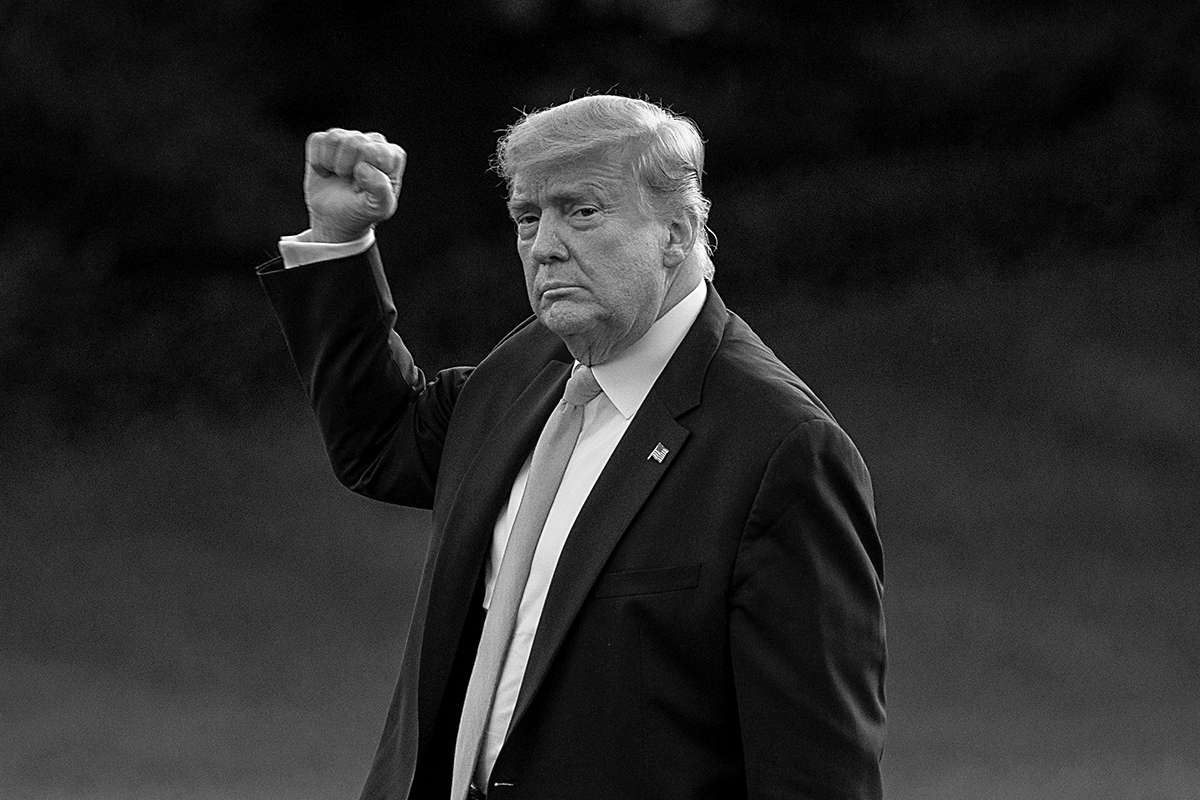The first thing I do when I wake up in the morning is open Twitter and begin scrolling. It’s a terrible habit, and I promise that I’ll kick it one day, but for now, I can’t help it. Why do I do it, you ask? Because every morning I open the cursed bird app to read that Donald Trump has tweeted or done something even more outrageous than the previous day. I’m addicted and I keep coming back for more.
For half a second, after seeing the latest dispute Trump has started, I chuckle and think, “I’m lucky he’s not my president.” I tell myself that as a Brit, I can breathe a sigh of relief. Except, every day, as my drowsiness wears off, I realize that I can’t. I wipe the smug grin off my face and sober up in the knowledge that, as President of the United States, Donald Trump can wield his political power not only over marginalized communities in the U.S., but over communities across the world — including my own.
In recent years, Trump has not shied away from indulging in antisemitic tropes. Let’s recap some of the stand-out moments: telling Jewish people that Israel is “your country.” Refusing to condemn neo-Nazis. Retweeting followers of the antisemitic conspiracy theory QAnon. And finally, announcing “I don’t want your money” to a Jewish audience at a Jewish forum. But of course, he’d deny all such claims are antisemitic because he has Jewish grandchildren.
As a British Jew with Eastern European heritage, I am terrified of the impact that Trump will continue to have on the European Jewish community, as well as my Jewish siblings in the States. I’m dreading the possibility that he could get re-elected this November. For him to remain incumbent signals that, all over the world, it’s fine for the person who holds the highest office in the United States to spew racist, xenophobic, and antisemitic sentiments.
If somebody like Donald Trump can sit comfortably in the White House — arguably, as the most powerful politician on the planet — then where can’t antisemitism gain power?
Across Europe, we’re seeing far-right antisemitic movements cropping up and winning elections. Hungary and Poland both have far-right parties in government. I fear that they won’t be the only European countries in which far-right parties gain enough traction to get into government over the next few years. In France, for example, polls have shown that support for Marine Le Pen, leader of the far-right National Rally Party, has increased considerably in recent years.
The mobilization of the far-right is a global phenomenon, egged on by Trump himself. Last year, Trump said that Viktor Orbán, far-right Hungarian Prime Minister, was doing a “tremendous job” in office, adding that Orbán is “respected all over Europe.” Reader, he is not. Dubbed by some as the “illiberal international” — a right-wing fan club with Donald Trump as its kingpin – this group of emerging far-right populist governments in Europe creates a hostile and deeply antisemitic environment for its Jewish citizens. And the movement, legitimized by the Trump administration, is growing quicker.
A 2019 survey conducted by the Anti-Defamation League (ADL) uncovered some horrifying statistics that exemplified this growing far-right trend in Europe. In the survey, 67% of Hungarian responses suggested that Jewish people have “too much power in the international economy.” In Poland, 21% of respondents believed that Jewish death during the Holocaust happened but has been “greatly exaggerated.” Overwhelmingly, the survey found that there is a decent chunk of Europeans who think that Jews have too much power and need to stop talking about the Holocaust so much.
Before the election of Donald Trump, antisemitism in Europe tended to peak when significant events in the Israeli-Palestinian conflict happened. For example, the Gaza war in 2014 led to a spike in antisemitic attacks in Britain. But, in 2016, this changed — it appeared that antisemitic spikes no longer had a connection to events happening in the Middle East. In fact, there are no spikes at all anymore because, since 2016, there has been a continual rise in antisemitic incidents in Britain and across Europe.
Wasn’t there a really important election in 2016? And wasn’t that election won by the same man who refused to condemn neo-Nazis and peddles the dangerous stereotype that Jews are wealthy and powerful?
I’m not claiming, by the way, that Trump’s election is the only reason we are seeing rapid rates of increased antisemitism in Europe. There is an emerging nationalistic sentiment in many parts of Europe that are rejecting the liberal values of the European Union and are staunchly anti-immigration. But far-right politics and antisemitism go hand in hand. Naturally, when such governments crop up and are supported by superpowers like the U.S., antisemitism will prevail.
Voting the Trump administration out this November would send a clear message to Europe: Antisemitism is a dangerous threat to Jewish communities, and it won’t be tolerated in the highest of public office.
So yes, even from my station in the U.K., I wake up to doomscroll every day to see what’s happening in the United States. I’m terrified for what the future of European Jewry will become if Trump is given four more years to damage our already-sparse communities. I know it will be a future grappled with fear.
Header image: President Donald Trump walks on the south lawn of the White House on October 20, 2020. Photo by Tasos Katopodis/Getty Images.



